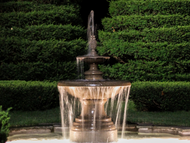Dec 4th 2019
Lone Tree Farm: Where Classic Design Resists Time
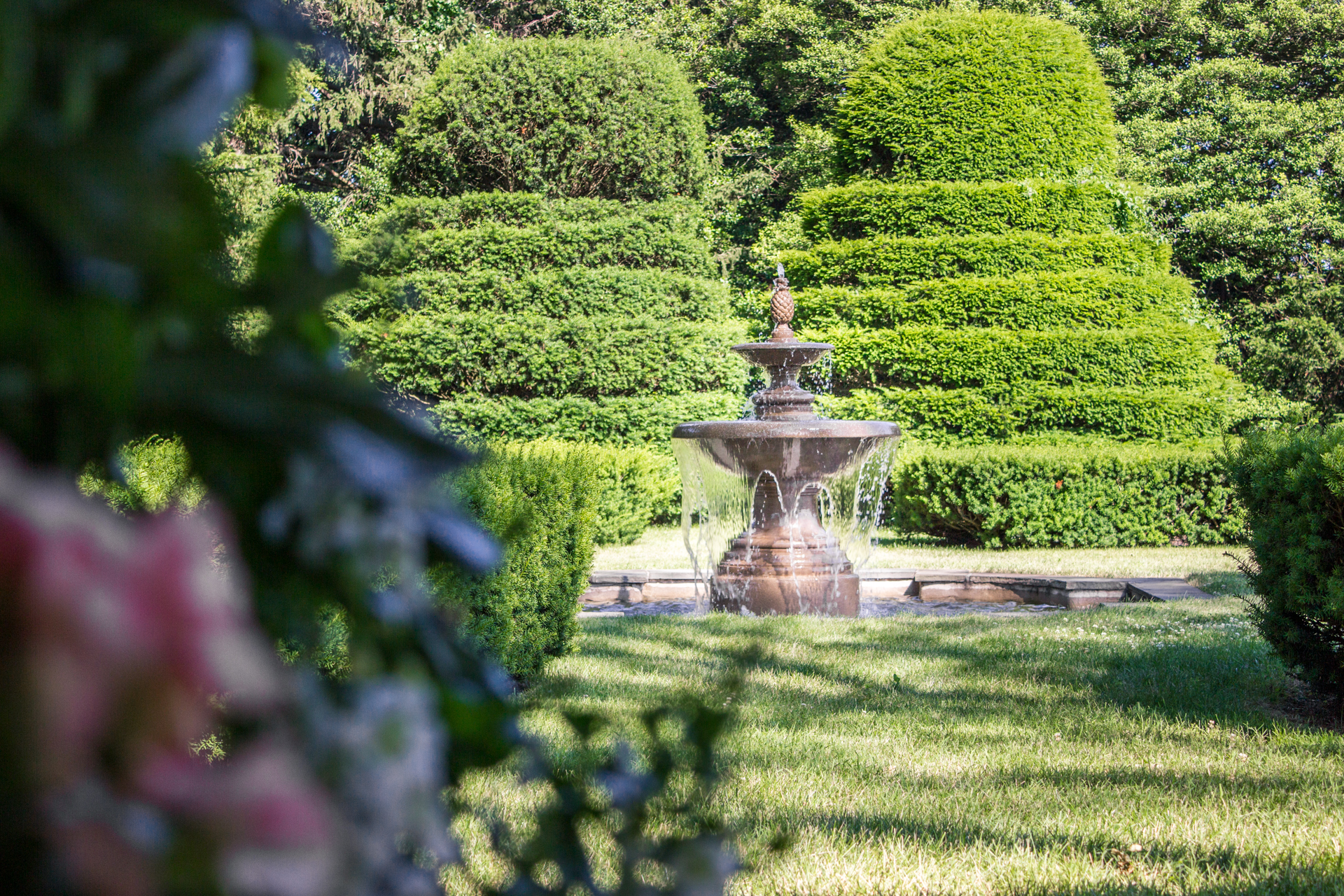
The Tiered Tureen Fountain stands as the focal point of this formal hedge garden.
We are excited to share this first edition of a series of stories profiling Kenneth Lynch & Sons products in their final garden settings on our clients’ properties:
There was a time before the automobile and before electricity, when even the most modest country homes stood quietly on sprawling acres. In 1832, a one-room, two-story colonial house was erected along a dirt road in New Canaan, CT. The modest home stood at the forefront of 45 acres of rolling hills and young maples, not a neighbor in sight.
In 1906, the home and land were purchased by Yale graduate and director of the American Book Company, A. Victor Barnes, who spent summers in town. In time, Mr. Barnes would secure additional land, and, by 1914 he had amassed a total of 106 pastoral acres. Leaning on the knowledge that comes with an acquired interest, he began a dairy farm and named it “Lone Tree Farm”, for the single, outstanding tree on a hilltop visible from the back of the house, once known as the highest point in town. Prized Jersey cattle grazed on the land, and when they weren’t busy moseying through pastures, they were shown—and coveted—throughout the country.
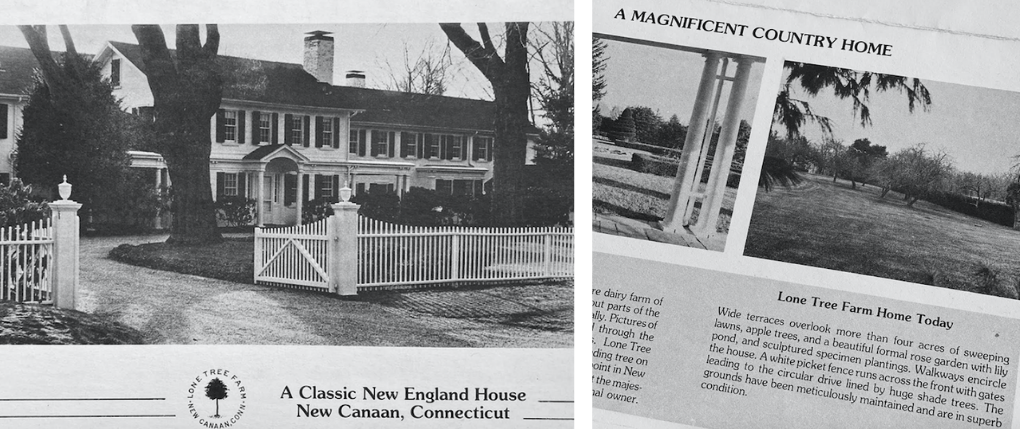
Images of the old property and garden featured in a brochure.
The farm was prosperous in its community support and supplied milk to the area during the early 20th century; meanwhile, Mr. Barnes continuously built additions to the once modest home. A living room here, a library there. A kitchen would be on the west side, accompanied without question by a butler’s pantry and formal dining room. But no country home would be complete without a meticulously maintained piece of property and outdoor “rooms,” created by carefully planned architecture, and in the English tradition of hedges, topiaries, and sometimes rambling but purposeful greenery.
The back of the home is a vista to the rest of the land, with varying layers and textures in landscape and flora visible in all directions, and made more pronounced by its slight elevation above the backyard. The land immediately surrounding the house needed to resemble the property as a whole. And a terrace and adjacent garden off the rear of the home are only too privileged to have a permanent view.
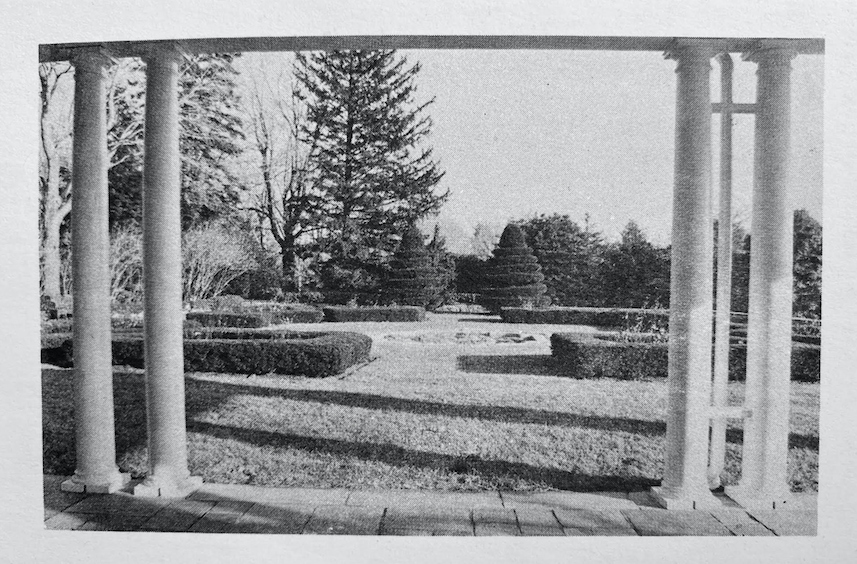
A view of the rose garden with the old lily pond in the center on the Barnes property.
Noted landscape architect, Freda Steggi, was a passionate admirer of English-style garden, and designed a formal rose garden to flank the terrace. With a central lily pond, yew hedging took the same shape as the pond, lilacs were planted at the north perimeter as a privacy screen from the road, and winding yew topiaries were placed at the top of a twin set of stairs down to another outdoor room.
The farm gradually reduced in size until the mid-60s when it was subdivided into fifteen smaller, but still substantial lots. City-dwellers moved to the country and the population of small towns began to grow with a little more swiftness. The main house of Lone Tree Farm was still magnificent, but its role as matron of a dairy farm was all but forgotten.
In the spring of 1981, a young couple visiting the home for sale was enamored with its historic colonial charm, formal and classic details, but especially the terrace and rose garden overlooking the backyard. It was truly the icing on the cake of a home they had already begun imagining themselves in—and its selling point. Lone Tree Farm was due for a respectful refresh, however, with much of the interior still dressed the way Mr. Barnes had done decades earlier. The owners looked past dated wallpaper and floors that needed refinishing, and made it their lifelong labor of love.
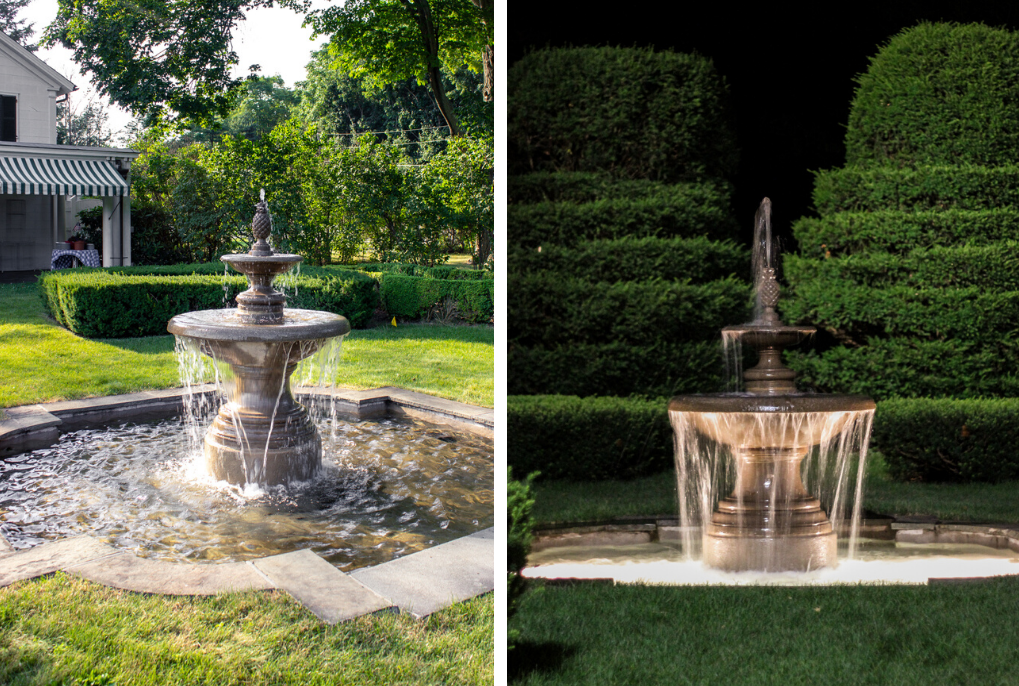
Left: The former lily pond ripples with the new life given by the fountain.
Right: Lit at night, the fountain glows beautifully.
In the early 21st century, a hundred years after Mr. Barnes began building his estate, the lily pond earned a duty beyond that of its latest role as unintentional reflecting pool. For twenty some-odd years the owners mulled over additions and changes to the garden, always hesitant to drastically modify this historic home and disrupt its integrity. Enter, Kenneth Lynch & Sons, and our commitment to classic, timeless design, superior craftsmanship, and respect for a property’s history, intention, and personality.
We produced our Tiered Tureen Fountain with a pineapple finial in the center of the pool, turning a once bleak and unused lily pond into a majestic and captivating centerpiece within this formal garden. This dramatic 6 ft. tall natural cast stone two-tiered fountain has deep bowls and can be self-contained, or set within a pool at ground level to catch the fountain splash, as in this classic installation. The true magic, however, lies in the fact that had a guest never seen the garden prior, they would never know it was not part of the early 20th century additions.
The fountain installation is the very essence of the definition of timelessness. To add a fixture of such prominence to an old but classic garden and make it appear as if it had stood there for decades is a direct result of our passion for and pursuit of impeccable design.
The deceit of an effortless appearance is that it actually takes immense effort. Though this fountain did not grace the eyes of Mr. Barnes, it certainly graces the property today as a deserving—and timeless—component that will stand the test of time.
Explore Kenneth Lynch & Sons Fountains
Photo credits: Alexandra Barnes
